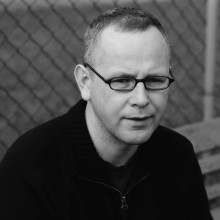Polish literature

Dariusz Sośnicki
Born in 1969 in Kalisz, he is a poet who read philosophy at the Adam Mickiewicz University. In 1994-96 he was editor of the bi-weekly literary journal Nowy Nurt [”New Current”]. In 2001 he went to Iowa on a writer's grant. He has published three volumes of poetry, and lives in Poznań.
One can only admire the consistency with which Sośnicki manages to pull off his concept of ”ineffective poetry”. Even in these poems, of course, there are some fireworks capable of stunning the experts at metaphor and versifying, yet the basic principle of choosing subject matter and props regarded as ”uninteresting”, ”commonplace” or ”everyday” always holds good. One of Sośnicki's most skilfully executed (and most highly valued) works is a detailed description of the area around a tramway loop. Another is an equally elegant monologue addressed to a mouse trapped in a bucket. The idea of concentrating on things that are so close to us as to go unnoticed is expressed in the titles of his first two collections. Marlewo is the name of a suburb of Poznań where Sośnicki used to live in a rented, unheated cottage, and is also the setting for the ”action” of these generally gloomy, claustrophobic poems. Ikarus (which is also a common make of public transport bus) came into being while he was working at Nowy Nurt (the leading literary journal of the 1990s), and so Rybaki Street, the site of the editorial office, takes a central position in this book. It was enough for Sośnicki to write a poem about the view from his window for the spot to become a place of pilgrimage for Poznań's young poets. The hydrant on Lachowicka Street became nationally famous when he compared it to ”the statue of a boy in a beret with the arms knocked off”. A typical feature of Sośnicki's work is a poetic spirit of inquiry, striving to create a full, synthetic vision of the object or situation being described; he often manages it in a few words, while sometimes it requires some detailed specification, as in Bird Song, which reports on the ornithological attractions of the poet's home neighbourhood. Symmetry is slightly different from its predecessors; even the title does not imply any solid association with a name, but is an idea from the realm of aesthetics. In this collection Sośnicki reveals the ontological foundation of his work, which is the ”element of symmetry” (which, according to the philosopher A. Falkiewicz, is the opposite of entropy), the tendency, common to nature and art, to take on regular forms. Also relevant are the facts that the poet has moved house, into a block of flats (an incredible poem called From the Ground Floor tells about the sounds echoing on the stairs), and become a father (interestingly, Sośnicki's son Witold made his first appearance in literature as a pupil at primary school and a conversation partner, whereas other Polish poets generally describe their children as infants and stop at that). Symmetry also includes some poems written in the USA, which prove that the trans-Atlantic trip did little to change the author's approach to reality. Sośnicki's poetry demands ”good faith”, intense concentration and sensitivity to the specific, and also rejection of current convictions about the hierarchical arrangement of the world. In this poetry anything can appear important, worthy of subtle analysis and installing in the most unexpected cultural contexts.
BIBLIOGRAPHY
- Marlewo, Ostrołęka: Pracownia 1994.
- Ikarus, Wrocław: Pomona 1998.
- Symetria, Legnica: Biuro Literackie Port Legnica 2002.
- Skandynawskie lato, Wrocław: Biuro Literackie, 2005.
- Folia na wietrze, Wrocław: Biuro Literackie, 2007.
- Państwo P., Wrocław: Biuro Literackie, 2009
- O rzeczach i ludziach. Wiersze zebrane 1991-2010, Wrocław: Biuro Literackie, 2011